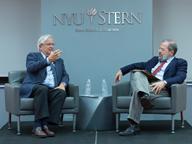Faculty News
—
In an op-ed, Profs. Viral Acharya and Bruce Tuckman explain how LOLR policies can be problematic
—

Excerpt from Financial News -- "The 'open for business' speech delivered by Bank of England Governor Mark Carney at the end of October was a new milepost in the policy of lending of last resort (LOLR). Authorities around the world have now conceded that central banks will, in times of stress, provide abundant liquidity to any or all systemically important institutions. Unfortunately, guaranteed liquidity enables and encourages firms to take excessive risks. Well aware of this 'moral hazard' effect, authorities have responded with stricter regulations and new resolution powers. We are skeptical, however, that a new regulatory regime—even if an improvement over previous ones—can close off all channels of excessive risk and leverage."
Faculty News
—

Excerpt from Financial News -- "The 'open for business' speech delivered by Bank of England Governor Mark Carney at the end of October was a new milepost in the policy of lending of last resort (LOLR). Authorities around the world have now conceded that central banks will, in times of stress, provide abundant liquidity to any or all systemically important institutions. Unfortunately, guaranteed liquidity enables and encourages firms to take excessive risks. Well aware of this 'moral hazard' effect, authorities have responded with stricter regulations and new resolution powers. We are skeptical, however, that a new regulatory regime—even if an improvement over previous ones—can close off all channels of excessive risk and leverage."




















